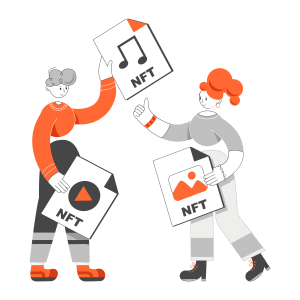
If you’ve been hearing a lot about NFT’s recently and have no idea what they are – you’re not alone.
NFT’s are everywhere. From exchange sites like OpenSea and Magic Eden, to the local taco shop, NFT’s are sparking the imagination of entrepreneurs around the world due to the endless opportunities they provide to promote and monetize businesses.
NFT’s are here. And businesses, large and small, are taking notice.
NFT stands for Non-Fungible Token.
What NFT’s are NOT, is Crypto. Crypto Currency, like physical money is Fungible. Fungible is something that is interchangeable and can be exchanged.
A $1 bill in New York City has the same value as a $1 bill in Miami. With Crypto, 1 BTC is worth 1 BTC no matter where it’s issued, Bangladesh or Bangor, Maine.
NFT’s, on the other hand, are unique digital assets. Every NFT has a digital signature that makes them one-of-one, with unique traits that make them different from each other. They are “non-fungible.”
The Bored Ape Yacht Club NFT Collection, for example, has multiple NFTs with different traits. A Bored Ape Yacht club with a “Bored Dagger” trait could be considered rarer than a “Bored Unshaven Pizza” trait.
The only similarity to Cryptocurrency is that NFTs also exist on different blockchain networks like Ethereum and Solana. A blockchain network contains a public ledger that records all NFT transactions. The blockchain technology is used to verify ownership, as well as any sale or transfer, making it easy to verify who the owner is.
This is especially important for Small Businesses who may consider using NFTs to represent a physical asset, such as access rights or a customer rewards program.
NFTs can be a great way to promote and monetize a business.
Charmin and Taco Bell have auctioned off themed NFT art to raise money for charities. And Coca-Cola donated more than $575,000 from their Loot Box NFT to Special Olympics International. All were very effective promotions for their brands.
The NBA chose NFT’s to monetize their brand. To date, NBA Top Shot NFT’s have generated more than $500 million in sales.
So how can you use an NFT in your business? There are as many ways to use NFTs as there are businesses.
A no-brainer is to create your own NFT and sell it. You get paid and the buyer gets the NFT. Simple.
But wait! Did you know if you include it in the smart contract of the NFT, you get a 5% to 10% royalty on every NFT sold? And that those royalties are perpetual? So, if that original NFT is resold you collect a royalty, at the new selling price. And if it sells again?
Well, you get the idea. You can think of that NFT as a potential revenue stream.
Now let’s say you’re a restaurant and every year you hold the hottest New Year’s Eve party in town. Your ticket to the event could be an NFT, adding a new level of promotion with every ticket sold.
As demand for party tickets go up, an NFT/ticket holder may choose to resell, since demand has driven up the value. That original $100 NFT is now worth $1000. So, the original buyer resells.
In the end, you made money selling the original NFT, the buyer made money when they resold the NFT, and you collected a 10% royalty ($100) on the resold NFT.
That’s a win-win-win.
Other popular examples of NFT uses are:
• At the grand opening of a new pizza business, the first 100 people to buy an NFT get a pizza once a month for forever. They can use it or resell it to someone else. Remember that royalty?
• You could move your service contracts to NFT’s. Holders get priority service when there is an issue. Or they can sell their NFT to others who have the same products. New customer and new royalty.
• A CPA could sell NFT’s that give the buyer one hour of consulting, per month. The new owner could resell their NFT, giving someone else their remaining hours of consulting. The CPA could potentially gain new clients every time the NTF is resold. Plus, the royalties!
The opportunities are endless.
Even though NFT’s can be great investments, they also come with tax consequences.
While the mere purchase of an NFT does not trigger a taxable event in and of itself, using cryptocurrency to make this purchase does. Any expenditure of cryptocurrency usually results in a taxable gain or loss.
NFT’s are considered intangible assets and thus, when sold, usually trigger a taxable gain or loss.
Furthermore, royalties generated through NFT “smart” contracts are considered taxable income.
Before you dive into NFT’s, it’s a good idea to check with your CPA or Accounting Firm. Find someone who knows the ins and outs of both NFT’s and Crypto and the tax implications.
NFT’s are hot. Creating and selling them may be an excellent option for your business. NFT sales can create cash flow or be used to raise capital for expansion. Plus, your NFT’s create residual income in the form of royalties.
By leveraging NFT’s, you can create new economic possibilities for your business.
NFT’s are not the future. NFT’s are here now. And their business potential is endless.